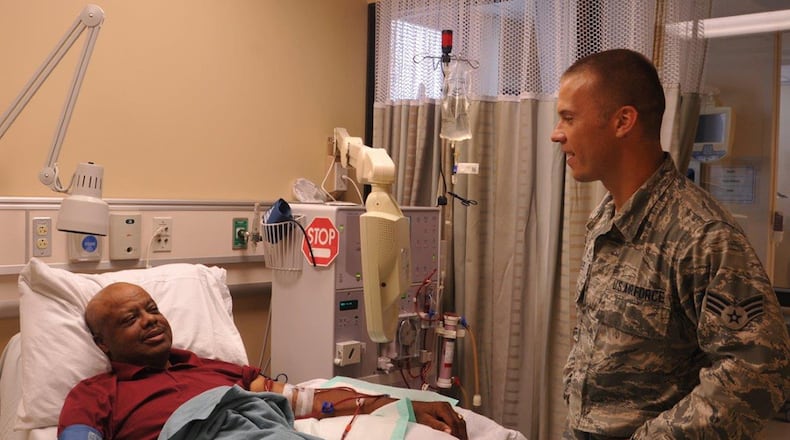“What people don’t realize is not only do the kidneys produce urine, the kidneys are primarily responsible for blood pressure,” said Maj. Brian Snow, 88th Medical Group director of hemodialysis and staff nephrologist.
Chronic kidney disease is a non-reversible condition when there is a decrease in the kidney’s ability to filter the blood by removing waste products and/or regulate electrolytes and acid base status.
Chronic kidney disease can be developed from conditions such as high blood pressure or vascular disease. For example, if someone has experienced a heart attack or stroke, there may be poor blood flow to the kidneys.
“Kidneys are important to the regulation of blood pressure,” Snow said. “The kidneys will sense when the blood flow is low so it will then secrete renin, an enzyme to regulate the blood pressure. If someone has uncontrolled hypertension, they will be referred to the clinic for treatment.”
There are five stages of chronic kidney disease, and the stages are determined by the glomerular filtration rate, the flow rate to filter through the kidneys. The GFR for the average person is in the range of 90-120.
“Patients with chronic kidney disease are typically referred to our clinic when they are in stage three and have a GFR range of 30-45,” Snow said. “Once a patient is referred to the Nephrology clinic, we treat the underlying cause, as an example, if someone has high blood pressure, we look at their medications and make adjustments to protect the kidneys and stabilize them from getting worse.”
When most patients have a GFR less than 15, they are considered for dialysis to filter and clean the blood. However, the determination to begin dialysis is based on the patient’s symptoms and not the GFR number.
Kidney transplants are another option for patients with chronic kidney disease and are considered when the GFR is less than 20. Currently, the University of Cincinnati, the Cleveland Clinic, Ohio State University and the University of Kentucky are the nearest transplant centers to Wright-Patterson Air Force Base.
To prevent kidney disease or to slow its progression, Snow recommends consuming a low salt diet, exercise and avoiding nonsteroidal anti-inflammatory drugs or NSAIDS, such as naproxen or ibuprofen, avoiding tobacco products and drinking in moderation.
“If you are on medications, make sure you are taking them and if you have diabetes, keep it under control,” Snow said. “And if you have other medical issues, ensure you are seeing a specialist.
“We cannot reverse the damage from kidney disease, but here at the Nephrology clinic, we can provide personalized quality care by helping patients manage the disease and prevent the kidneys from getting worse,” Snow said.
To receive care at the 88th Medical Group Nephrology clinic, patients must be referred by their primary care provider. Patients who are currently on dialysis and are interested in receiving dialysis treatments at the 88th MDG hemodialysis clinic, contact the Nephrology clinic at 257-9052.
For additional information on kidney disease prevention or treatment, go to the National Kidney Foundation at www.kidney.org/.
About the Author
